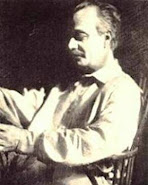BIRD BRAIN
By Jeganathan Ramachandram
I have a story to tell
of a fish which had the head of a bird
it wandered many times about this obscure reality
but the fish never realizing it was the head of donkey
wagged its tail every time it wants to swim
So goes the story of life
each of us think
we own the moment...never realizing
that the moment stays awhile and moves past us
We own nothing … we are only a part of the act of life
It is sad that this ignorance
has taken centre stage in our life
in ignorance man is believing ...
HE OWNS.
How often have I been reminded of the truth behind the above poem and painting, and yet how easily I sometimes disregard it, especially at times when I need to remember it the most.
I suppose, when overcome with the intensity of difficult moments, it's easy to not see what you know to be true. Instead, the mind reaches out to the familiar yet false security offered by one's weak mind, and succumbs to the comfort of helplessness. And in all helplessness, we begin to blame ourselves and all that surround us. But really, who are we to claim responsibility for anything that happens in our lives when "we own nothing, and are but a part of this act of life"? Ellaam avan seiyal, said our forefathers. How apt. Indeed, old is gold (as a friend aptly reminded me of earlier today) :).
The man who wrote and painted the above told me recently that I do not know how to be more accepting of anything and everything that form my life. The problem, he said, lies in my proneness to "think". How true what he said was. When the "director" who is responsible for conceiving each scene of my life sits in absolute command above, who am I (the mere actor who carries out his instructions = live my life) to question His decision as to how the scenes should flow.
Indeed, life (and ways to live it) is universal. How else then can you explain the uncanny similarities between what we Indians believe to be the truth of life, and what Shakespeare had in mind when he wrote the following...
All the world's a stage,
And all the men and women merely players:
They have their exits and their entrances;
And one man in his time plays many parts,
His acts being seven ages. At first the infant,
Mewling and puking in the nurse's arms.
And then the whining school-boy, with his satchel
And shining morning face, creeping like snail
Unwillingly to school. And then the lover,
Sighing like furnace, with a woeful ballad
Made to his mistress' eyebrow. Then a soldier,
Full of strange oaths and bearded like the pard,
Jealous in honour, sudden and quick in quarrel,
Seeking the bubble reputation
Even in the cannon's mouth. And then the justice,
In fair round belly with good capon lined,
With eyes severe and beard of formal cut,
Full of wise saws and modern instances;
And so he plays his part. The sixth age shifts
Into the lean and slipper'd pantaloon,
With spectacles on nose and pouch on side,
His youthful hose, well saved, a world too wide
For his shrunk shank; and his big manly voice,
Turning again toward childish treble, pipes
And whistles in his sound. Last scene of all,
That ends this strange eventful history,
Is second childishness and mere oblivion,
Sans teeth, sans eyes, sans taste, sans everything.



No comments:
Post a Comment